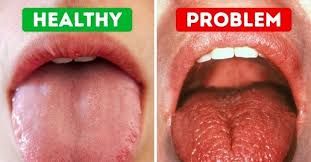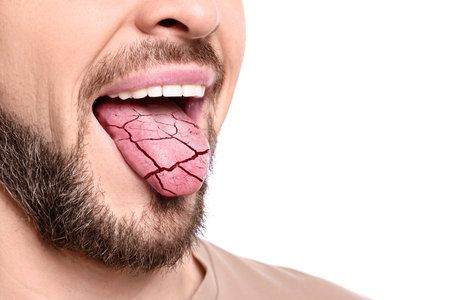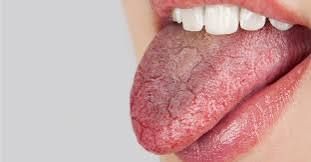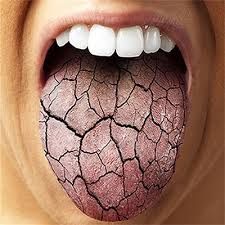"When you're not properly hydrated, your body works to conserve the fluid it does have. That's why one of the first signs of dehydration is decreased saliva production. Your tongue might feel dry and even swollen as your body reduces saliva production to conserve fluid"Source
A human tongue can be a very valuable tool in detecting indicator hydration status, revealing physical signs of dehydration. Here are the important characteristics of such tongues:
1- Dryness and Rough Tongue's Texture
If a tongue appears dry or even rough to touch and palpation, it’s often one of the major sign that the body is not secreting enough and required saliva as a result of dehydration. The normally hydrated and healthy tongue should be felt as a smooth and moist surface.
2- White or Yellow Coating
The spotting of a thick, white or yellowish coating substances on your tongue surfaces either in the lateral borders, ventral or dorsal can signal dehydration. This buildup surfaced owing to absence or lack of enough saliva to cleanse wash away bacteria accumulation, material alba and dead cells.
3- Cracks or Fissures
One of the most common feature of a severely dehydrated tongue is cracks on the surface of the tongue. However, it can be shallow or deep. Likewise, it may appear along the middle or possibly across the tongue as the case maybe. Last but not least, if these cracks leads to severe discomfort and pain, it could signal a severe dehydration or an infection.
4- Swollen Tongue
Tongue sometimes can be revealed as a larger mass than usual or the condition of feeling uncomfortable on speaking or swallowing. This swollen sometimes could be due to fluid retention that occurs as a result of homeostatic body response to dehydration.
5- Dark Red or Discolored Tongue
A possibility of dark red or discolored tongue in some cases can point to dehydration. A tongue could be spotted as darker or even more red than it should normally be especially when it is excessively dry or inflamed owing to lack of moisture.
Proper Hydration is good for a Healthy Mouth
"Staying hydrated is critical for your oral health, as it ensures adequate saliva production. Saliva not only keeps your mouth moist but also plays a key role in protecting your teeth, gums, and tongue. When you’re dehydrated, your saliva production decreases, leading to a host of oral health problems"Source:
Some of those clinical appearances are the following;
1- Increased Risk of Cavities:
Saliva assists in neutralising the acids in the mouth which have been widely reported to cause tooth decay . Absence or little saliva,
is tantamount to bacteria accumulation, resulting to plaque buildup and also increased risk of cavities.
2- Gum Disease:
Dehydration can also aid periodontal disease. Saliva is highly necessary for cleansing away food particles, material alba, debris and also preventing bacteria from building up along the gum line.
3- Dry Mouth (Xerostomia):
Chronic or long term dehydration can be a gateway to dry mouth, a condition where salivary glands produce too little saliva. Dry mouth will not only causes discomfort but also open the oral cavity as a whole to high risk of dental issues, oral malodour and oral infections.
To avoid dehydration and its negative effects on the tongue, it’s very essential and important to maintain proper hydration throughout the day. Here are some practical tips to assist maintenance of adequate and optimal hydration:
1- Regular intake of WATER
"The most obvious and effective way to stay hydrated is by drinking enough water. The recommended daily intake is about 8 glasses (64 ounces) of water a day, but your needs may vary based on your activity level, climate, and overall health. Keep a water bottle with you to encourage regular sipping throughout the day."Source
2- Eating Hydrated Foods
Certain foods have high moisture content and can help to be hydrated. These includes and vegetables such as watermelon, cucumber, lemon, oranges, mango, celery, grapes among others. Takes these diets on regular basis can boost hydration levels naturally.
3- Avoidance of Caffeine and Alcohol
Both caffeine and alcohol have being clinically observed to aid dehydration by acting as diuretics, which makes body to lose more fluids either through sweating or urination and so on.
Therefore, it is very important to limit these beverages, most especially in hot weather conditions or even after physical activity, and should be replaced with water or herbal teas that could have therapeutic actions on the body system.
4- Using a Humidifier
Humidifier can be of great importance to those living in a dry climate or frequent patients of dry mouth. As applying it either at home or office can assist in keeping the air moist and alleviate up to certain limits the drying effects on your tongue and mouth in general.
5- Regular rinsing of MOUTH with WATER
After meals or snacks, mouth rinsing with water to wash and flush away food particles and debris can assist in keeping a moist oral environment for the tongue and mouth.
Happy Blogging and Reading 💥💥💥💥
Video from Mayo clinic YouTuber



